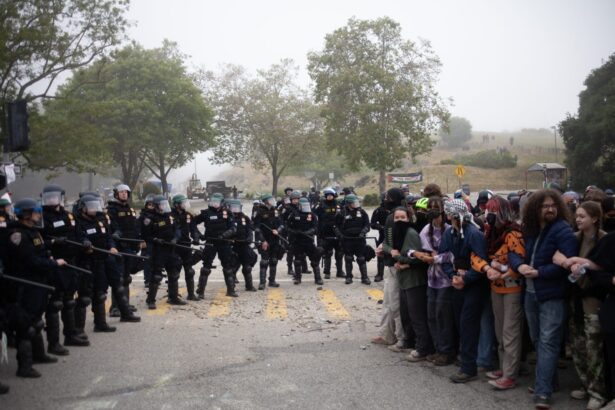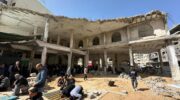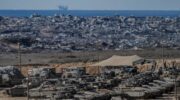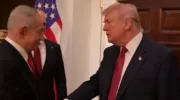Schools across the U.S. have altered policies and even landscapes in an attempt to make a repeat of last spring’s Palestine protests impossible. The result is a far-reaching war on free expression and the increased militarization of higher education.
by Carrie Zaremba, reposted from Mondoweiss
University administrators across the United States have declared an indefinite state of emergency on college campuses. Schools are rolling out policies in preparation for quashing pro-Palestine student activism this Fall semester, and reshaping regulations and even campuses in the process to suit this new normal.
Many of these policies being instituted share a common formula: more militarization, more law enforcement, more criminalization, and more consolidation of institutional power. But where do these policies originate and why are they so similar across all campuses?
The answer lies in the fact that they have been provided by the “risk and crisis management” consulting industries, with the tacit support of trustees, Zionist advocacy groups, and federal agencies. Together, they deploy the language of safety to disguise a deeper logic of control and securitization.
Schools used this past summer to hear from consultants and prepare the crackdown, with no time to waste. As the Assistant Director of Campus Safety at Oberlin College reminded participants on the recent webinar, Navigating Campus Controversy: Challenges of Managing Protests and Critical Events, “if your students are gone now, this is a good time to tighten up your policies.”
Inside the ‘risk and crisis’ consulting industry
Run by ex-military, law enforcement, and campus public safety officials, the risk and crisis management consulting industry constitutes a critical node of a larger repression network of state actors, partisan off-campus groups, and the Zionist lobby, who collectively work to criminalize student political dissent. Risk management involves financial and non-financial risks, everything from regulatory compliance to campus safety.
Institutional investors, driven by mandates for safe, predictable returns, encourage universities to adopt stringent risk management frameworks that prioritize financial stability and institutional reputation over intellectual integrity.

In the era of the Student Intifada, pro-Palestinian student activism is regarded by stakeholders as posing risks severe enough to justify policies that reconfigure the boundaries of permissible expression.
This summer, the risk and crisis management consulting industries hosted several convenings directly focused on the student protests. In July, over 450 “campus protection professionals” convened in Atlanta for the 11th annual Campus Safety Conference: “Since the current unrest is extremely challenging to navigate and will likely continue into the 2024-2025 academic year, this year’s [conference] will solely cover protest successes and challenges.”
The conference advisory board consists of current and former law enforcement like Bobby Brasher, whose biography boasts that he “has spent time in Israel observing Israeli strategies and tactics.”
Highlights from this year’s conference included surveillance technology product demonstrations, tabletop exercises, and a session titled Armed Staff: Security Enhancement or Liability?
The Blue Moon Consulting Group is another firm that serves dozens of universities and colleges. It recently hosted its own “campus unrest”-themed Crisis Leadership Retreat in Breckenridge, Colorado, where participants received training in media relations, and protest management policy and planning.
Such gatherings evoke a cross between a corporate PR workshop and a weapons expo, showcasing the latest security gadgets while offering polished media strategies for handling campus protests.
This coordinated crackdown is further exemplified by the Hillel Foundation and Secure Community Network’s (SCN) recent launch of “Operation SecureOurCampuses,” a security campaign targeting over 50 campuses. This summer, the SCN co-hosted a roundtable discussion with the Major Cities Chiefs Association featuring public safety officials from 92 universities and “representatives from the FBI, law enforcement association leaders, and Jewish security professionals.”
The discussion produced ten security recommendations, such as banning encampments, implementing emergency plans, and deepening collaboration with law enforcement—all of which have rapidly been enacted across the country in recent weeks.
Campus changes nationwide
These gatherings help explain the uniformity of the new policies recently announced on campuses across the U.S. From liberal arts schools like Pomona College, to large public university systems like the California State University System, administrations have imposed a spate of anti-protesting guidelines in the lead-up to the fall semester.
Bans on encampments, temporary structures, amplified sound, chalking, freestanding signs, flyering, outdoor displays, and event tables are among the measures introduced to curtail political expression. These sweeping measures close existing loopholes and preemptively stifle spontaneous and organized political activity.
The University of South Florida’s revised “Activities, Signage, and Use of Public Space” policy illustrates this move, asserting that “the University reserves the right to determine how to apply and interpret all time, place, and manner limitations on Activities.”
Nearly all recent university policy updates have intensified the bureaucratic hurdles for student organizations to gain approval to host an event. Some have gone further to capture control of campus activities. Carnegie Mellon University’s updated Expressive Activity Registration policy stipulates that all events involving “expressive activity” that deviate from the Freedom of Expression Policy “will be considered unregistered.”
In such cases, the administration will decide “whether it is in the best interest of campus safety, security and operations to prevent or disband the event, or not, and whether…[those] involved in providing leadership for organizing and executing such unregistered event should be subject to conduct review.”
Centralizing control through subjective interpretations of “expressive activity” ensures that Greek Life events may proceed with minimal scrutiny while groups like Students for Justice in Palestine (SJP) faces administrative and disciplinary harassment.
Universities have methodically crafted policies to enshrine the privileged status of students who align with their political and material interests. New York University’s updated Guidance and Expectations on Student Conduct codifies the conflation of antisemitism and anti-Zionism into the school’s non-discrimination and anti-harassment policy and procedures for students (NDAH).
This update transforms Zionism into a TITLE VI protected class on NYU’s campus, where “speech and conduct that would violate the NDAH if targeting Jewish or Israeli people can also violate the NDAH if directed toward Zionists.”
NYU’s Faculty for Justice in Palestine (FJP) chapter warns that “the new guidance implies that any nationalist political ideology (Hindu nationalism, Christian nationalism, etc.) that is integrated into some members of that group’s understanding of their own racial or ethnic identity should be entitled to civil rights protections,” a precedent that further entrenches the administration’s role in policing political discourse.
This shift not only reinforces administrative control over campus politics but also insulates its policies from challenge by equating dissent with harassment.
The University of California, which allocated $29 million to counter the Student Intifada in the spring, announced a ban on “masking to conceal identity” and a directive requiring individuals to reveal their identity when asked. As new COVID-19 variants sweep California, President Drake framed these measures as “key to achieving the delicate but essential balance between free speech rights and the need to protect the safety of our community.”
However, this notion of safety, devoid of public health considerations, endangers the entire community, granting campus police broad discretion to selectively legitimize norms of compliance. These new restrictions will disproportionately impact the immunocompromised, undocumented students, and Black and other over-policed minorities, while simultaneously exposing student organizers to increased risks of doxxing, harassment, and surveillance.
Similarly, the University of Virginia, James Madison University, and Virginia Commonwealth University have implemented mask restrictions in compliance with Virginia Code 18.2-422, which bans any mask, hood, or other garment that conceals the wearer’s identity. These measures reflect a broader trend among public universities in states threatening to withhold funding from institutions that fail to contain pro-Palestine student organizing.
Louisa County, for instance, pulled all of its funding for Piedmont Virginia Community College (PVCC) in its 2025 adopted budget after the SJP chapter hosted a screening of the documentary film “Israelism” on campus.
“Institutional neutrality,” under the aegis of the “Chicago Principles,” has recently been embraced by the University of Texas System, Emerson College, and Purdue University, and may represent the next major frontier in the systematic recalibration aimed at quelling political expression on campus. This approach, as advised by the American Council of Trustees and Alumni in their new report An Equal Space for All: A Trustee Guide to Preventing Encampments and Occupations on Campus, advocates that financial decisions be “left to fiduciaries rather than political actors.”
In practice, however, it allows administrations to completely elide the question of divestment for the foreseeable future while profiting from and investing in genocide.
Beyond policy solutions, the risk and crisis management consulting industries shape the physical and operational landscape of campuses. Their suggestions often push clients to purchase gear from partners in the burgeoning “campus safety market,” leading university administration to, in turn, allocate more money to meet the ever-growing cost of managing dissent.
To respond to the Student Intifada, universities have invested in license plate readers and AI classification tools to identify and monitor non-student “outsiders.” This investment in surveillance technology enhances internal security infrastructure while deepening ties with law enforcement.
For example, as reported by CBS New York, the NYPD has worked with dozens of schools to devise protest response plans for the fall, notably a zero-tolerance policy on encampments. This university-police collaboration spans all scales, from local mutual aid agreements to DHS-backed Fusion Centers.
Campus militarization
Such coordination will fuel the increased militarized campus policing emblematic of the post-9/11 era, with over 100 colleges and universities now equipped with military surplus gear through the Department of Defense’s 1033 program. The integration of SWAT teams and paramilitary gear into campus life, along with its own system of ID checkpoints, embodies the ambitions of war-profiteering university trustees who envision higher education as an extension of U.S. empire.
As campus police acquire more advanced technology, university administrations eagerly funnel resources to accommodate their growing arsenal, perpetuating an arms race within the academic sphere.
This professionalization has been accompanied by the rise of campus policing expertise as a distinct field of knowledge production. It is a technocratic pursuit situated within the administrative engine of the neoliberal university, a system of efficiency and control designed to maximize “security.” Under the guise of neutrality, the label of expertise attached to campus policing conceals its biased alignment with the Board’s financial interests.
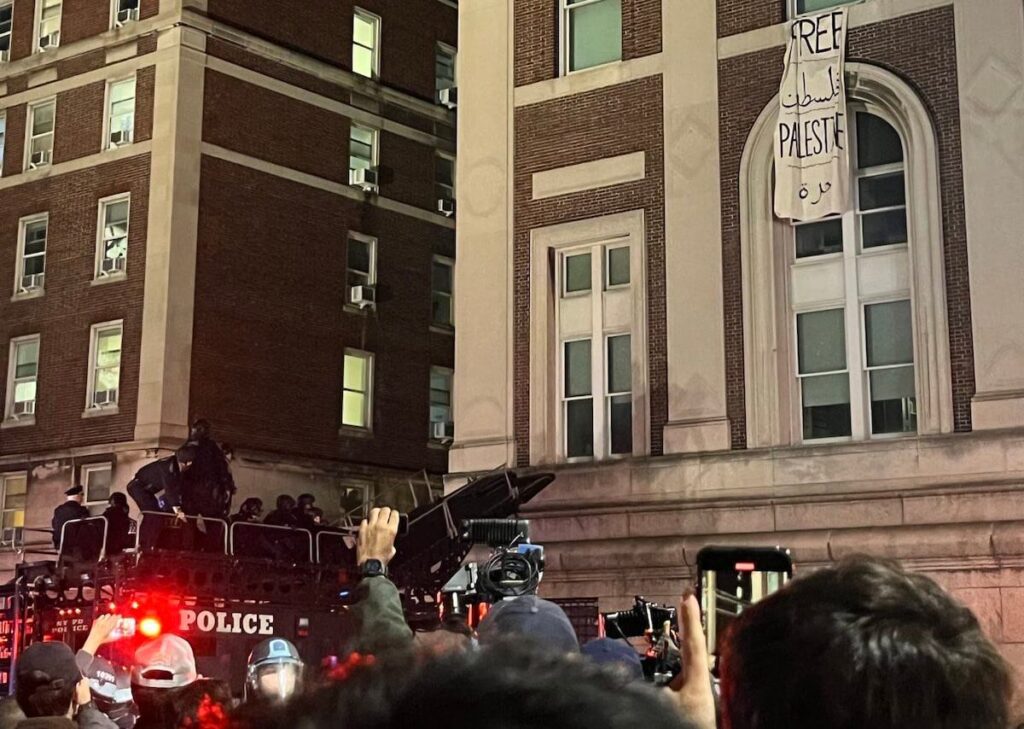
Against this backdrop, the intensified online surveillance of student activism illuminates the digital underbelly of militarized repression. In July, the University of North Carolina Police Department—recipient of $2.3 million of diverted DEI funding redesignated after last year’s protests—obtained a search warrant to seize Instagram data from the UNC SJP Instagram account such as names, addresses, phone numbers, credit card information, connection logs, direct messages, and location.
This follows a $73,500 annual contract signed in 2016 between the UNC Police Department and Social Sentinel social media monitoring. Meanwhile, the Orange County District Attorney’s Office continues to pursue criminal charges against community members and students for their participation in the Triangle Gaza Solidarity Encampment. UNC SJP remains under suspension on “an interim basis while the student conduct process considers allegations of violations of University policies,” according to school officials.
Long before the Student Intifada, both private and public universities sought to eliminate Students for Justice in Palestine (SJP) from their campuses. Last year, George Washington University and Rutgers University suspended their SJP chapters after the fall semester; under the pretext of restoring order on campus, both universities have again targeted SJP.
George Washington’s SJP is suspended through the fall, while Rutgers’ SJP will remain suspended until the summer of 2025. Alongside SJP, GWU further suspended Jewish Voice for Peace and six other student organizations, including those that provide essential cultural and religious services, such as the Muslim, Arab, and Asian American Student Associations.
In a statement condemning new university anti-protesting policies, the American Association of University Professors (AAUP) denounced the introduction of these “top-down edicts” that “bypass the central role of elected faculty bodies, such as faculty senates, in university governance.” The AAUP notes that these policies will particularly affect “contingent and full-time non-tenure-track faculty members, and graduate student employees, especially people of color in these groups.”
In another case of administrative overreach, the University of Pennsylvania provided the House of Representatives Committee on Education and the Workforce with Professor Huda J. Fakhreddine and Dr. Ahmad Almallah’s CVs, syllabi from the Fall 2022 semester onward, all course-wide communications since the fall 2023 semester, and any communications related to the Gaza Solidarity Encampment, Faculty for Justice in Palestine, or the Palestine Writes Festival since August 1, 2023.
While the university agreed to provide their CVs and syllabi and placed holds on both professors’ university email accounts—despite not being legally obligated to do so—it remains unclear how much additional information it will share with the committee.
Attacking student governance
This escalating authoritarian oversight similarly manifests in recent developments to curtail student decision-making power. This summer, the UNC System announced its plan to reorganize its Honor Court after over 100 years, moving from a student-led to a faculty-led model. Screenshots of a UNC Board of Trustees group chat obtained via a public records request reveal the underlying motivation for this shift, with one trustee commenting that disciplinary decisions “should be adjudicated either in the criminal courts or via the Provost, NOT within the Honor Court.”
The revocation of longstanding student decision-making bodies like UNC’s Honor Court may signal an emerging trend. As students and faculty pursue their divestment demands, universities might gradually attempt to dismantle shared governance structures to maintain absolute top-down authority.
Last week, in a decisive 16-1 vote, the New School University Student Senate (USS) suspended all funding to registered student organizations until the university meets SJP’s divestment demands. To retaliate, the administration seized $400,000 of student funds and announced that they would now unilaterally control the management of these funds without the input of elected student representatives.
University administrators are acutely aware that the student body sides with liberation. Student referendums have historically served as a useful tactic in the long-term campaign to enact BDS on campus.
In the 2023-2024 school year, for example, divestment referendums passed at Clark University, Bowdoin College, UMass Amherst, and numerous other campuses. Confronted with these results, university presidents frequently overturn student-led divestment referendums, as demonstrated recently by the University of Pennsylvania and Cornell, where presidents rejected BDS ballot outcomes despite them passing with a majority.
Some administrations go so far as to cancel the referendum altogether, as was the case at Vanderbilt and the University of Michigan last school year. Students’ overwhelming support for BDS follows at the level of student government. Last school year, every UC undergraduate campus student government, except UC Berkeley, adopted student funding divestment resolutions.
The consequences of new university anti-protest policies have already unfolded at the University of Michigan. On August 28, police violently intervened to thwart a “die-in” on the Diag organized by the school’s divestment coalition. The aftermath left two individuals hospitalized and four arrested, including a 16-year-old.
As the academic year progresses, these episodes of state violence will undoubtedly become the norm rather than an exception.
When Zionist-trained law enforcement officers descend onto campus quadrangles to perform spectacles of administrative accountability to the Board of Trustees, the imperial boomerang returns, binding the brutality of overseas and domestic settler security states.
Carrie Zaremba is a Baltimore-born, Brooklyn-based organizer with National Students for Justice in Palestine (NSJP). She graduated with a degree in anthropology from Pomona College in 2023, where she co-led Claremont SJP and Claremont Jewish Voice for Peace (JVP). Her research examines urban counterinsurgency, social movements, and cultural geographies of U.S. militarism.
RELATED ARTICLES:
- Debunking three myths about pro-Palestine student protests in the US
- Detailed study finds 99% of pro-Palestine protests at US universities are peaceful
- Anti-Defamation League (ADL) again sides with human rights abusers over free speech on campus
- ADL Campus guide describes how to block events about Palestine
- The Israel-Affiliated Organization Leading the Backlash Against Student Protests
- Maccabee Task Force covertly funded 3,200 pro-Israel events on US campuses
- Israeli embassy official describes using false identities on Facebook, deception on campus
- Columbia crackdown led by university prof doubling as NYPD spook
- Are US officials’ investments of public funds in Israeli bonds ethical? How much is too much?
- Success: Illinois University Reverses Ban on Palestine Event

